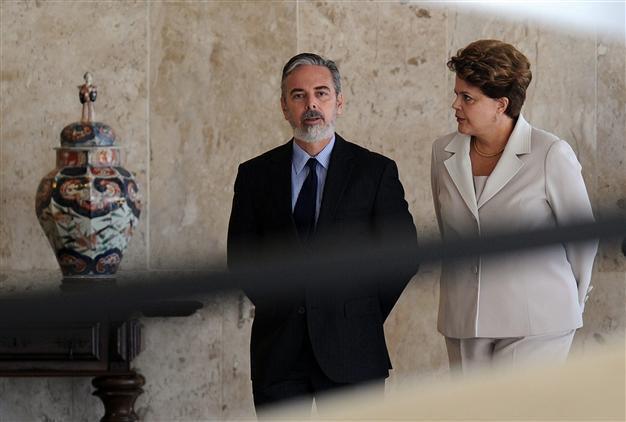Brazil’s Foreign Minister Patriota resigns over row with Bolivia
BRASILIA - Agence France-Presse

Brazilian President Dilma Rousseff (R) talks to his Foreign Minister Antonio Patriota. AFP Photo
Brazil's foreign minister resigned Monday over rising tensions with La Paz after Brazilian diplomats spirited away a Bolivian opposition senator wanted for corruption.
"President Dilma Rousseff has accepted minister (Antonio) Patriota's resignation," a government spokesman told AFP, adding that he would be replaced by Luis Alberto Figueiredo, Brazil's ambassador to the United Nations in New York.
The announcement came after a meeting between Rousseff and the 59-year-old Patriota late Monday.
A Brazilian diplomat had revealed earlier in the day that he helped Bolivian opposition senator Roger Pinto escape to Brazil after he was holed up for 15 months in Brasilia's embassy in La Paz despite having been granted asylum.
Pinto, an opponent of Bolivian President Evo Morales, made his escape Friday in an embassy car escorted by Brazilian marines, driving 22 hours to the southwestern Brazilian city of Corumba, 1,600 kilometers (1,000 miles) from La Paz.
"I chose life. I chose to protect a person, a persecuted politician, like President Dilma was persecuted," Eduardo Saboia, the Brazilian charge d'affaires in La Paz, told Globo television on his arrival in Brasilia, where he was recalled for consultations.
The diplomat said he made the personal decision to help Pinto escape "because there was an imminent threat to the life and dignity of the senator." He said Pinto was suffering from depression and was contemplating suicide.
The Bolivian government views Pinto as a fugitive from justice after he was accused of corruption, for which he was sentenced to a year in prison.
He sought refuge at the Brazilian embassy last year, claiming to be a victim of political persecution after he denounced alleged cases of corruption and alleged links between authorities and drug traffickers.
His case strained relations between La Paz and Brasilia. Morales last year said Brazil's decision to grant Pinto asylum was "a mistake." In La Paz, Bolivian Foreign Minister David Choquehuanca expressed "deep concern over the transgression of the principle of reciprocity and international courtesy." "Under no condition could Senator Pinto leave the country without a safe conduct pass," Choquehuanca said.
Pinto, who flew from Corumba to Brasilia on Sunday, had not been granted permission to leave his country.
Brazilian authorities "made a humanitarian decision to ... help me achieve my freedom," Pinto said.
In a letter released by his right-wing National Convergence party in La Paz on Monday, the senator thanked all those who made his escape possible and expressed gratitude to Rousseff for granting him asylum in May 2012.
"My exit is proof to Morales that good prevails in the end," the senator said in his "Open letter to the Bolivian people," railing against "the violation of human rights in Bolivia." Pinto said he would continue speaking out against "narcotrafficking, corruption, (and) abuse of power in Bolivia," as well as "against the humiliation of Bolivians" who do not share Morales's leftist politics.
The Brazilian foreign ministry said Sunday it was investigating how Pinto was able to leave the embassy and would take appropriate measures.
Meanwhile a government statement said Rousseff thanked Patriota for his performance since he was appointed foreign minister more than two years ago and "announced his appointment to the Brazilian mission to the UN (in New York)." The foreign ministry confirmed to AFP that Patriota, who had served as ambassador to the United States from 2007 to 2009, would head Brazil's UN mission after completing some administrative procedures.
His successor, 58-year-old Figueiredo, joined the foreign ministry in 1980 and represented Brazil in several international meetings on climate change.
